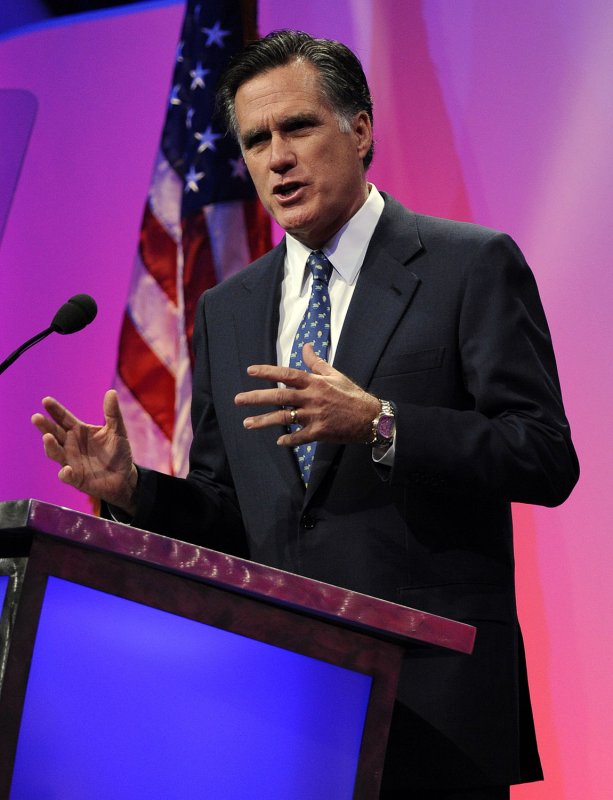1 of 2 | Republican presidential candidate former Gov. Mitt Romney speaks to an Americans for Prosperity (AFP) Foundation summit in Washington on Nov. 4, 2011. UPI/Roger L. Wollenberg |
License Photo
After posturing and jockeying among states trying to raise their profile and leverage in influencing the Republican presidential nominating process, the Iowa party caucuses will soon kick off the "official" 11-month run-up to 2012's Election Day.
When some state Republicans maneuvered to set their candidate selection dates in such a way as to interfere with the first four so-called carve-out states -- Iowa, New Hampshire, Nevada and South Carolina -- secretaries of state weighed in to try to keep them from conducting a primary before March 6 and to ensure the campaign process didn't interfere with the holiday season. Republican National Committee threats of a substantial loss of delegates didn't seem to sway anyone -- changes were made anyway.
Florida leaders set the state's presidential primary for Jan. 31, risking the loss of 99 delegates for bucking national Republican Party rules -- and the state is hosting the Republican National Convention in August.
But it isn't about the delegates, it's about the mighty mo -- as in momentum -- that the early states bring, backers of the change in the traditionally tough battleground state said.
At one point, New Hampshire party officials threatened to conduct its first-in-the-nation primary in December. But when the dust settled, New Hampshire penciled in its primary for Jan. 10, a week after the Iowa caucuses.
Another state that will lose delegates is South Carolina, which decided to hold its GOP primary Jan. 21, officials said, since Florida moved its date to Jan. 31.
South Carolina Republican Party Chairman Chad Connelly made no bones about his unhappiness with his neighbor to the south when the Palmetto State announced the switch in early October.
"Forty-nine states played pretty in the sandbox," he said. "Only one did it wrong."
Nevada will hold caucuses Feb. 4. Nevada Republicans, awarded one of the four coveted early-state slots by Democratic and Republican national committees, tried legally to hitch their caucus date to the Saturday after the New Hampshire primary, but New Hampshire officials refused to discuss scheduling and threatened the December primary.
Georgia Secretary of State Brian Kemp said in September his state would hold its presidential party primary March 6, also known as Super Tuesday, and would hold national officials' feet to the fire to ensure states that upset the primary-caucus schedule were held accountable. If there were no punishment, "there'll be hell to pay," Kemp said.
But as all the maneuvering was going on, something happened among the Republicans seeking the party's blessing to be its standard-bearer next November: No clear-cut favorite emerged.
While Mitt Romney hangs at or near the top, it's been a revolving door for other "anyone-but" candidates, with former House Speaker Newt Gingrich the latest to press the former Massachusetts governor in the polls. Georgia businessman Herman Cain, Texas Gov. Rick Perry and U.S. Rep. Michele Bachmann of Minnesota all having polled just above or just below Romney at previous points in the campaign, while Rep. Ron Paul holds on to a core of libertarian-leaning followers, and former Utah Gov. Jon Huntsman and former U.S. Sen. Rick Santorum of Pennsylvania remain in the chase.
"The Republican race has been the most chaotic that I have ever seen and the most unpredictable," Stuart Rothenberg, editor and publisher of the non-partisan Rothenberg Political Report, told Voice of America. "The race in one respect is pretty clear: A quarter of the Republican Party wants Mitt Romney and the other three-quarters want to have nothing to do with him."
Fits over the party preference calendar aside, campaigning for 2012 seemingly began almost before everyone got their committee assignments at the start of the current Congress, making for one l-o-n-g political season.
"The nomination process has become hyperextended and America now has, by far, the longest process for selecting a national executive of any democracy," said political commentator Steven Schier, a political science professor at Carleton College in Minnesota. "This is not good, because the nation devotes far too much attention to campaigning and not enough to governing. So the earlier the nomination process starts, the worse it is for America's political system."
Schier says he expects the Republican field to narrow a bit by February.
"At this point, it's likely that Romney and Gingrich will survive as durable candidates, and perhaps one other candidate -- but whom that might be is impossible to guess," he said. "In addition, Ron Paul will soldier on for several months because of his solid, but minority, support among Republicans who are libertarians."
Sadly for some, he said, "by the end of January, most of the field will be out of money and out of hope."
To recap, the caucus and primary schedule in January is:
Jan. 3, Iowa caucus.
Jan. 10, New Hampshire primary
Jan. 21, South Carolina primary
Jan. 31, Florida primary















